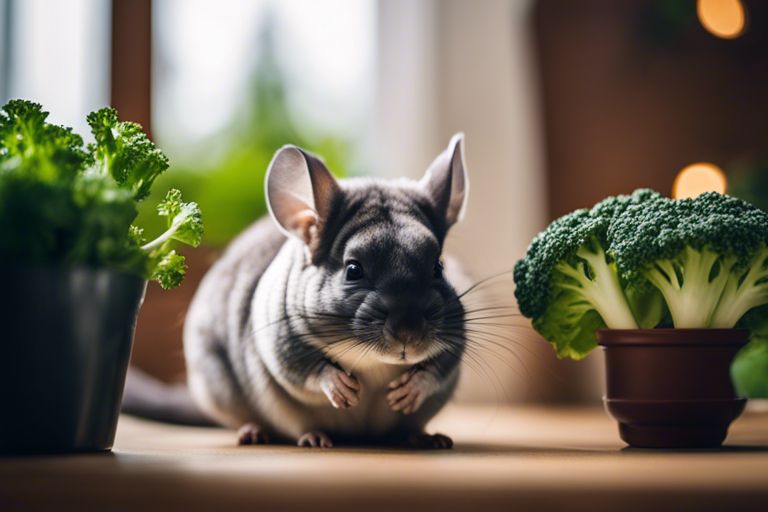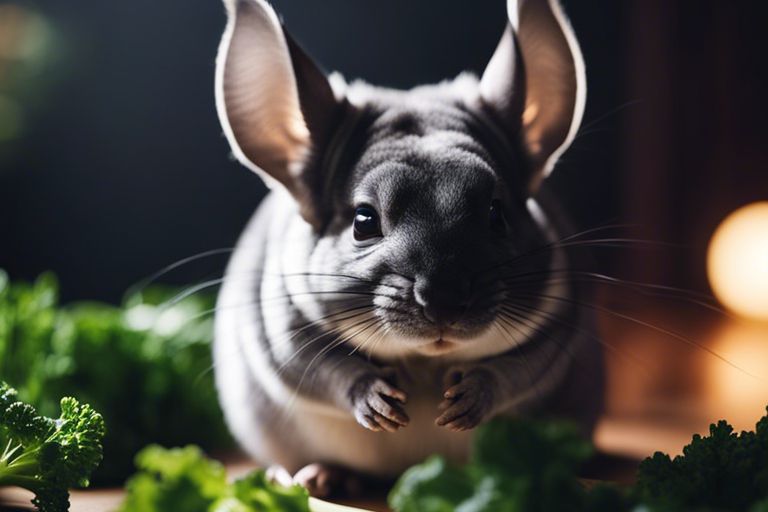It’s vital to be mindful of what you feed your chinchilla to ensure their health and well-being. In the matter of kale, chinchillas can eat kale in moderation. While kale is packed with nutrients like Vitamin C and calcium, it must not be the primary source of their diet due to its high calcium and oxalate content. Including kale as an occasional treat can provide variety and nutrition, but overfeeding can lead to digestive issues and potential mineral imbalances. Always consult with a veterinarian or knowledgeable professional before introducing new foods to your chinchilla’s diet to ensure their safety and optimal health.
Key Takeaways:
- Kale can be fed to chinchillas in moderation: While kale can be a nutritious addition to a chinchilla’s diet, it should only be given in small amounts as it is rich in calcium and oxalates.
- Monitor your chinchilla’s reaction: Introduce kale gradually into your chinchilla’s diet and observe for any signs of digestive issues or allergic reactions.
- Diversify their diet: Chinchillas benefit from a varied diet, so kale can be offered occasionally along with other safe vegetables, hay, and pellets to ensure they receive proper nutrition.
Understanding Chinchillas
Natural Habitat and Diet
Some chinchillas originate from the mountainous regions of South America, specifically the Andes Mountains. In the wild, they thrive in rocky, arid environments with sparse vegetation. Their diet consists mainly of grasses, herbs, and small insects found in their natural habitat.
Nutritional Requirements
On a captive diet, chinchillas need a balance of hay, pellets, and fresh water to sustain their health. Hay is crucial as the primary source of fiber, aiding in digestion and wearing down their constantly growing teeth. Pellets should be specially formulated for chinchillas and make up the bulk of their diet, providing vital vitamins and minerals. Fresh water should always be available in a clean, sturdy water dispenser to keep them hydrated.
The calcium-phosphorus ratio in a chinchilla’s diet is vital to prevent metabolic issues. Foods high in fat and sugar should be avoided as they can lead to obesity and dental problems. Offer a variety of safe treats in moderation to prevent boredom but avoid sudden dietary changes that can upset their sensitive digestive system. Consulting a veterinarian specializing in exotic pets can provide personalized guidance on your chinchilla’s nutritional needs.

Kale and Its Nutritional Content
What is Kale?
On the leafy green spectrum, kale is a true nutritional powerhouse. This cruciferous vegetable belongs to the Brassica family, alongside broccoli and Brussels sprouts. Kale is renowned for its exceptional nutrient profile and is often hailed as a superfood due to its high levels of vitamins, minerals, and antioxidants.
Vitamins and Minerals in Kale
What sets kale apart is its impressive array of vitamins and minerals. This vegetable is particularly rich in vitamin K, vitamin C, and beta-carotene. It also contains significant amounts of vitamin A, vitamin B6, calcium, and manganese. These nutrients play crucial roles in maintaining overall health and well-being.
Plus, kale is a fantastic source of antioxidants such as kaempferol and quercetin, which help combat inflammation and oxidative stress in the body. Its high fiber content promotes digestive health, while compounds like glucosinolates have been linked to cancer prevention.
Can Chinchillas Eat Kale?
Potential Benefits of Kale for Chinchillas
Not all vegetables are suitable for chinchillas, but kale is one that can offer some nutritional benefits. Kale is rich in vitamins A, C, and K, as well as calcium and fiber. These nutrients can contribute to a chinchilla’s overall health and well-being.
Risks and Considerations
With any new food introduction to a chinchilla’s diet, caution is advised. While kale can be beneficial, it is also high in calcium and oxalates, which can potentially lead to health issues such as bladder stones and kidney problems if fed in excess. It’s important to moderate the amount of kale given to chinchillas and ensure a balanced diet.
Potential signs of overconsumption of kale or other high-calcium vegetables include a decrease in appetite, lethargy, and difficulty urinating. If you notice any of these symptoms, consult a veterinarian immediately.
Feeding Kale to Chinchillas
Recommended Portions and Frequency
All chinchillas should only be given kale as a treat, not as a regular part of their diet. The recommended portion of kale for a chinchilla is a small piece, about the size of their ear, no more than once a week. Kale is high in calcium and oxalates, which can be harmful to chinchillas if consumed in large quantities regularly.
Alternative Leafy Greens and Foods
Portions of other leafy greens like romaine lettuce, cilantro, and parsley can be incorporated into a chinchilla’s diet in small amounts, alongside their main hay and pellet diet. These greens should be introduced slowly to prevent any digestive issues. Additionally, chinchillas can enjoy small portions of fruits like apples and berries as occasional treats. Note, variety is key to a chinchilla’s diet, but consistency and moderation are crucial to prevent health issues.
Final Words
The verdict is in: chinchillas can eat kale in moderation. While kale offers some health benefits, it should not be a staple in their diet due to its high calcium content. Be sure to introduce new foods slowly and monitor your chinchilla for any adverse reactions. Remember to prioritize their main diet of hay and pellets for optimal health and well-being.
